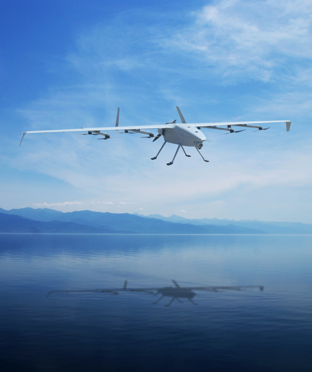
The Sierra Nevada Corp.’s unmanned Voly Vertical Takeoff and Landing (VTOL) aircraft. (Image: Sierra Nevada Corp.)
Sierra Nevada Corp. (SNC) on Dec. 5 said the Navy awarded it a prototype other transaction (OT) agreement to develop the technology to support autonomous unmanned air transport capability for naval logistics purposes.
Under this award, SNC will use its artificial intelligence systems with its Voly vertical takeoff and landing (VTOL) Unnamed Aerial System (UAS) to help the Navy with its project to improve light cargo resupply capabilities via unmanned systems, the Blue Water Maritime Logistics UAS program.
The program specifically looks to solve a Navy challenge in being able to deliver light cargo over long ocean distances to reduce the burden on manned aircraft.
SNC said it will help develop the technology to help support the Navy with an on-demand, autonomous, unmanned air transport delivery capability needed for the U.S. Navy’s fleet and Military Sealift Command (MSC).
“The autonomous movement of critical parts and supplies in distributed maritime operations increases operational readiness and warfighting capability of embarked ships or aircraft,” the company said.
The company boasted its Voly UAS is a hybrid vertical takeoff and landing (VTOL) aircraft with payload, range and endurance capabilities needed for multi-role operations. SNC underscored the aircraft can simultaneously carry cargo, additional fuel and sensors.
“SNC is proud to partner with the Navy to develop this critical game-changing technology. Our Voly solution with its long-haul capability, provides the technological advancements needed for safe and reliable resupply to geographically dispersed maritime environments,” Josh Walsh, SNC vice president of programs, said in a statement.
In 2020 the Navy said historic data showed warships often moved into partially or non-mission capable status due to logistics issues like electronics parts or assemblies that usually weigh under 50 pounds. Missions to deliver these kinds of parts are currently performed by H-60 helicopters or V-22 Osprey tilt-rotor aircraft, but this review spurred the service to look into using Group-3 size UAS.
At the time, Naval Air Warfare Center Aircraft Division (NAWCAD) had already acquired a Skyways Air Transportation Inc. drone for this Blue Water Maritime Logistics UAS experimental cargo transport.
SNC argued its unmanned VTOL aircraft has significant advantages over other UAVs or conventional fixed-wing aircraft for this kind of mission: they can perform point takeoff and landing with minimal space requirements, feature redundant lift motors and avionics, increased maneuverability, and the ability to land after engine or other catastrophic failures.
The company said its part in the Blue Water Maritime Logistics UAS program envisions Navy assets bringing large amounts of supplies to forward operating bases where fleets of unmanned aircraft can deliver needed parts to vessels in complicated maritime environments. This could help deliver the cargo to more widespread destinations.
“An unmanned resupply capability allows users to overcome the contested logistics challenges of the future and ensures forward-deployed units are stocked with parts and supplies needed for operations,” said Tim Harper, SNC vice president of business development.
“The Voly hybrid UAS represents a new opportunity to completely disrupt how critical assets are delivered, by minimizing personnel and filling the gap where traditional delivery methods are unable to achieve the mission,” he continued.
Previously, in 2021 NAWCAD awarded PteroDynamics a contract to supply three of its VTOL drones for the Blue Water Maritime Logistics UAS program.
The Voly originated as a drone made by the former company Volansi, which SNC acquired in 2022.
A version of this story originally appeared in affiliate publication Defense Daily.